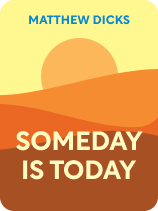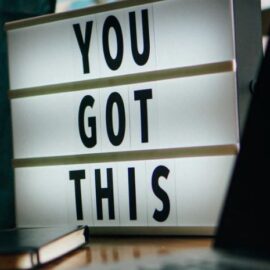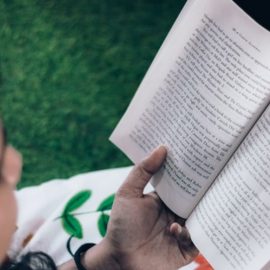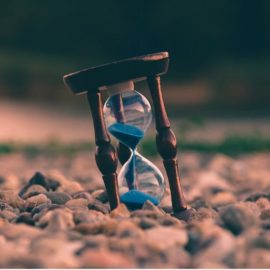

This article is an excerpt from the Shortform book guide to "Someday Is Today" by Matthew Dicks. Shortform has the world's best summaries and analyses of books you should be reading.
Like this article? Sign up for a free trial here.
What tasks do you do routinely? What if you could get them done more efficiently and free up time for more substantive work?
In Someday Is Today, Matthew Dicks argues that achieving your dreams and overcoming mediocrity is possible, but only if you start acting now. He shares advice on how to maximize your time, efficiency, and productivity when it comes to everything you have to do, including your routine tasks.
Continue reading to learn how to get things done faster in three practical ways.
How to Get Things Done Faster
Dicks recommends minimizing the amount of time you spend on recurring, routine tasks—such as doing laundry or cleaning the dishes—regardless of whether they’re subjectively important or not. Dicks explains that, since you perform these tasks repeatedly, they could take up large portions of your life.
He shares recommendations on how to get things done faster so you can create more free time that you can devote to pursuing your goals.
| Minimize Tasks by Monitoring the Time Spent on Them In The Effective Executive, Peter Drucker reiterates the importance of minimizing time spent on routine tasks to increase your overall productivity. However, he notes that before you can truly optimize your efficiency in completing routine tasks, you must first track how much time you currently spend doing them. This is because our sense of time is often distorted—we under or overestimate how long we actually spent on a task, and we have a skewed view of what we were actually doing during that time frame. This can cause us to overlook tasks that should be optimized because we think we’re already efficient enough at them. For example, you might think you spent 10 minutes doing laundry, but you actually spent 15 minutes on this task. Further, while you think you were doing laundry the entire time, you actually spent three of the 15 minutes texting. You won’t optimize doing the laundry unless you figure out the discrepancy between your assumptions and reality. |
Dicks presents three main tips to minimize the time you spend on routine tasks:
Tip #1: Create Efficient Systems and Routines for Completing Tasks
Dicks notes that using systems and routines to complete tasks will help you streamline the process and save time. For example, reduce the time it takes to dress your child in the morning by creating an organization system for their clothing—that way, you won’t have to waste time looking for certain items. Further, create a dressing routine that streamlines the process and ensures you don’t forget anything—brush their teeth, comb their hair, put on their socks, underwear, pants, and shirt, and then put on their shoes.
(Shortform note: In Essentialism, Greg McKeown also recommends using systems and routines to boost your efficiency, and he gives a few additional recommendations to ensure that they’re effective. Complete the hardest parts of the system or routine first so you keep your momentum and don’t dread completing hard tasks at the end of the day. Further, alter your routine slightly each day of the week to avoid boredom. Finally, implement one new system or routine at a time so you don’t get overwhelmed.)
Tip #2: Minimize Decision-Making
Minimize time-consuming decision-making by planning choices in advance and limiting your options, Dicks recommends. For example, you might currently spend 30 minutes every night rummaging through the cabinets and deciding what to make for dinner. Instead, pick three starches, three vegetables, and three proteins for the week and eat them in different combinations so you don’t spend time coming up with and preparing complex meals.
(Shortform note: In The Art of Thinking Clearly, Rolf Dobelli agrees that having too many options —and therefore having to make more decisions—can waste time. He explains that having too many options paralyzes you with the fear of making the wrong choice, which leads to inaction. It can also cause you to lower your standards—you might get overwhelmed and prioritize making quick decisions blindly rather than taking the time to choose the best option.)
Tip #3: Multitask When Possible
Dicks notes that multitasking will help you get more things done at once so you have more free time to dedicate toward your goals. For example, instead of taking 10 minutes to eat dinner and then another 10 minutes to review tomorrow’s schedule, review the schedule while you eat dinner.
(Shortform note: While Dicks recommends multitasking to save time, Gary Keller warns in The One Thing that multitasking can actually waste time. He argues that multitasking decreases your effectiveness by splitting your focus. It also skews your perception of time and can trigger mistakes and bad decisions. For example, if you review your schedule during your 10-minute dinnertime, you might end up taking more time to finish your meal, making you late for an appointment; overeating because you’re not paying attention to how much you’re consuming; or missing that you double-booked an appointment for the next day because you were focused on your meal.)

———End of Preview———
Like what you just read? Read the rest of the world's best book summary and analysis of Matthew Dicks's "Someday Is Today" at Shortform.
Here's what you'll find in our full Someday Is Today summary:
- Why most people delay taking action toward their dreams and goals
- Tips for accomplishing extraordinary things in life
- How to maximize your time, efficiency, productivity, and creative potential






